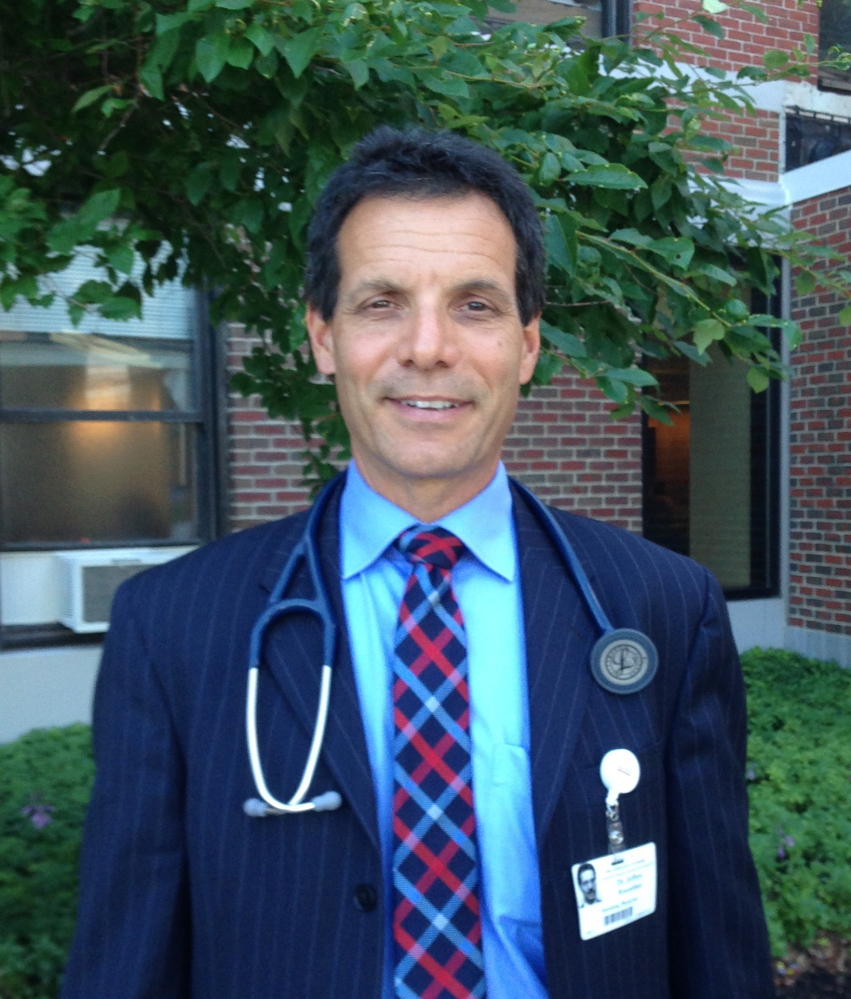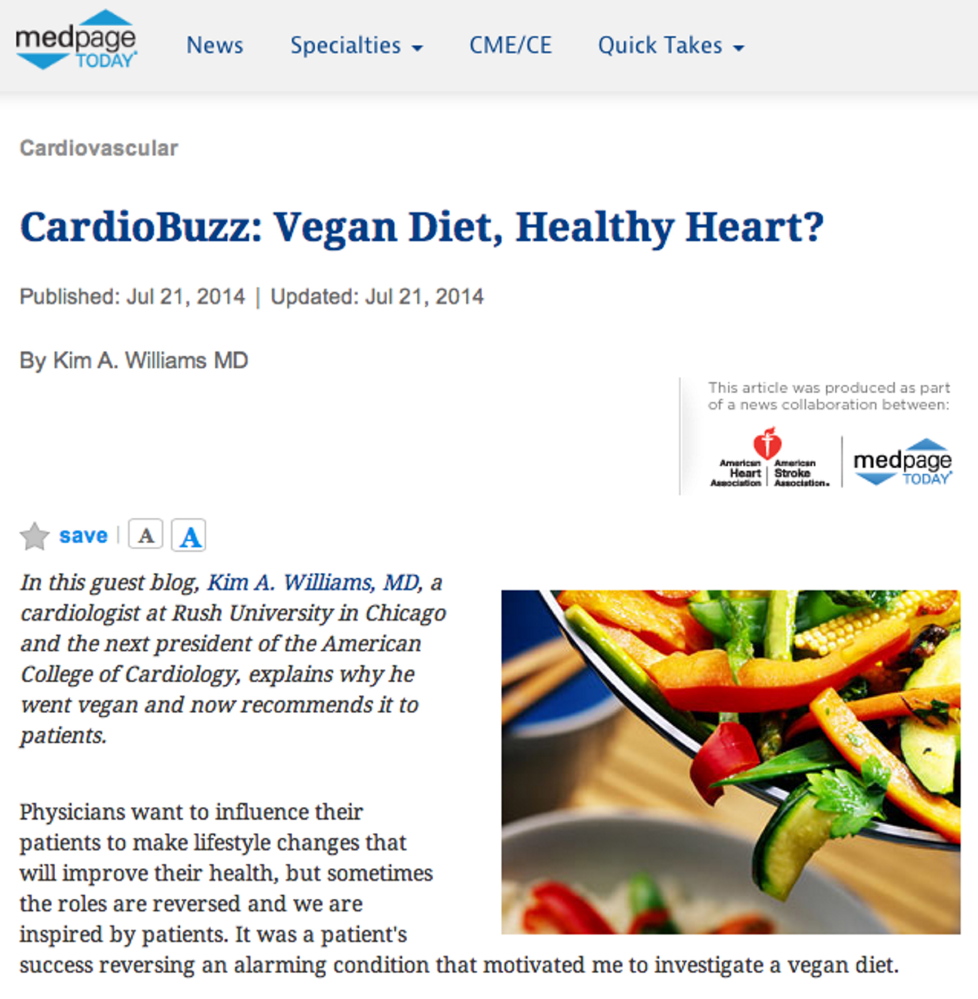When you publish an opinion piece saying you’d like to eliminate your profession, you’re bound to ruffle a few feathers.
This is exactly what Dr. Kim Williams did when he penned a column for medical news website Medpage Today in June. In it, the incoming president of the Washington, D.C.-based American College of Cardiology discusses his switch to a vegan diet and how it caused his LDL cholesterol to drop 80 points in six weeks. He goes on to say he often discusses “the benefits of adopting a plant-based diet with patients who have high cholesterol, diabetes, hypertension or coronary artery disease.”
Noting that while larger studies need to be done, Williams, the current chair of the cardiology department at Rush University Medical Center in Chicago, says the existing research provides “compelling” data about the ability of a plant-based diet to reverse heart disease. At the close of the essay, Williams asks, “Wouldn’t it be a laudable goal of the American College of Cardiology to put ourselves out of business within a generation or two?”
Cue the emotional response.
In the heated discussion in the comment section below his piece, the discussion swings between two extremes. At one end are those who agree with a commenter going by the screen name SRP, who writes, “It does scare the heck out of me that the next president of the American College of Cardiology has gone vegan.”
At the other end are those who fall in line with commenters like Murry Cohen: “FINALLY cardiologists are catching up. I remember in the 1980s they ridiculed the entire vegan diet thing.”
In between is scholarly discussion about the merits – or lack thereof – of the current body of scientific research.
Much of this hinges on whether or not the randomized control trials carried out by Dr. Dean Ornish and his colleagues serve as a valid basis for clinical practice. Ornish heads the Preventive Medicine Research Institute in California and has authored numerous books, including the 1995 New York Times best seller “Dr. Dean Ornish’s Program for Reversing Heart Disease” and the more recent “Everyday Cooking with Dr. Dean Ornish,” published in 2013.
To help sort through this debate, I turned to Dr. Jeffrey Rosenblatt, a cardiologist at Maine Cardiology Associates in Portland. Rosenblatt has collaborated with Williams in the past and both will speak later this month at the American Society of Nuclear Cardiology’s annual scientific session in Boston.
Rosenblatt agreed to meet me during a short break from his rounds on the cardiac care unit at Maine Medical Center. Since he had a full load of very sick people under his care, we wasted no time.
“People have to understand that one diet doesn’t fit all,” Rosenblatt told me, noting that there are other factors at play in health, such as genetics, that are still poorly understood. In addition, healthy people have more leeway when it comes to eating meat, he said.
Rosenblatt, an Iron Man triathlete, hasn’t eaten red meat for more than 30 years, while still eating some poultry and fish. He eats vegan food regularly and aims for “as much whole food as possible.”
But, he said, for people with heart disease, “the only real intervention that we know can actually reverse coronary artery disease is your diet, and the only proven diet – though in small trials – that actually causes regression (of disease) is a vegan diet.”
Ornish carried out those trials.
In 2011, when Rosenblatt served as president of Mercy Hospital’s medical staff, he brought renowned nutrition researcher T. Colin Campbell, Ph.D., to address the staff at their annual banquet. Campbell is the author of “The China Study,” one of the stars of the documentary “Forks Over Knives” and a leading proponent of a plant-based diet.
Rosenblatt said one reason members of the medical community may dismiss the research showing a vegan diet can reverse heart disease is that “as docs, we’re trained to write prescriptions.”
But, he said, there is no drug on the market that can reverse heart disease like a vegan diet.
When I asked whether the existing body of research is adequate, he said more large-scale studies at many sites, including Maine Medical Center, would be ideal, “but there’s really no funding to support a massive trial like that.”
Pharmaceutical companies often finance their own drug trials.
But rather than publicly finance more trials in the United States, Rosenblatt said, “the irony is that we’re spending billions of dollars patching people up instead.”
Another thing he dislikes about the current culture of pharmaceutical solutions is that “you’ve de facto said people aren’t going to take ownership of their health.”
In contrast, when Rosenblatt has patients with severe heart disease who are “motivated,” he said changing their diet is “the first thing I talk about.”
At this point in our conversation, his pager buzzed for what must have been the third or fourth time in 15 minutes. He made a quick phone call.
When he hung up the phone, he turned to me and pointed at a printed list of all the patients currently on the cardiac ward and said, “despite all these people being on medications, my pager won’t stop going off.”
Avery Yale Kamila is a freelance food writer who lives in Portland. She can be contacted at:
avery.kamila@gmail.com
Twitter: AveryYaleKamila
Send questions/comments to the editors.



